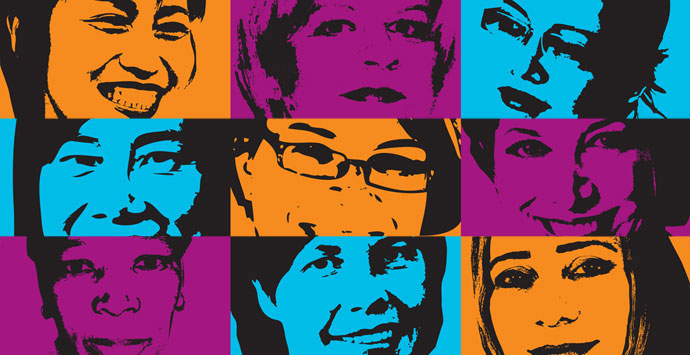Paige Reynolds | Contributing Writer
As International Women’s Day approaches it seems only appropriate to give more time to the word that led the voting in Time magazine’s “Banned Words” poll of 2014, the word so many love to hate: feminism.
Feminism in all its forms has been endlessly debated, and often causes divides amongst friends, families and even celebrities. Like all movements, there are numerous different branches, ranging from obvious to extreme. There are those of us who mostly want to do something about alarming rape statistics or female genital mutilation, and those of us who find it offensive for a man to hold a door open for a woman, equating politeness with male validation with general hatred of the patriarchy. Feminism is no longer synonymous with a bra-burning minority. It’s about equality, and anything about equality is everyone’s issue – not just a girl thing.
A recent report by the Tab revealed that a third of ‘Cuntry Living’ members were too afraid to post on grounds that they weren’t feminist enough or not well-educated enough to contribute to debate.
Many of us remember watching a slightly shaky Emma Watson conduct her first speech as a UN Women’s Goodwill Ambassador, supporting their “He For She” campaign. She pointed out that feminism is much more than just empowering women, it’s about dismantling gender stereotypes: getting rid of the expectations of being a woman just as much as the often unrealistic expectation of being a man. Expectations that put unnecessary pressure on individuals to conform and abide by society’s silent rules.
But feminism has also come under serious scrutiny. From English universities banning ‘Blurred Lines’ in their SU bars to the hurls of abuse thrown at a scientist for wearing a shirt patterned with naked women, there is an argument that hyper-feminism can be seen as petty and unnecessary, thus undermining the fight for equality in the eyes of the general public.
Some people have argued that militant feminism might in fact be non-progressive, that people shouldn’t have to tread on eggshells, and we are killing true debate. In my opinion, these two instances were hardly unfounded. If people are negatively affected by anything in the public eye, and even more so in a safe space (university campuses for example) and this problem can be easily fixed, well then why shouldn’t it be? But perhaps the militant ways issues like these are dealt with by the media and on social forums only serve to damage the cause.
Feminism is no longer synonymous with a bra-burning minority. It’s about equality, and anything about equality is everyone’s issue – not just a girl thing.
Some of you will have heard about the online feminist forum “Cuntry Living”. Originally started by a small group of Oxford University feminists, who simply wanted a forum for debate and a safe space to discuss all types of gender discrimination, the group has now grown to almost 10,000 online members. Generally speaking, the group allows women and men to post about their issues, whether it be abuse, rape, transphobia, homophobia or issues of female representation in the work place and at university. It seems that the debate generated by the group is reassuring for those who feel victimised and discriminated due to their gender.
However, a recent report by the Tab revealed that a third of ‘Cuntry Living’ members were too afraid to post on grounds that they weren’t feminist enough or not well-educated enough to contribute to debate.
This is where the real problem lies. The idea that you must adhere to every so-called feminist doctrine in order to be a feminist is exclusive and wrong. It hinders the cause when friends of mine hesitate to call themselves feminists because they don’t know enough about it. One remarked, “I quite want to take my husband’s name when I get married, so I guess I’m not a feminist.”
The whole point of feminism is equality, and equality means inclusivity. The fight for equality is not over. While it is of paramount importance to educate people and to preach your beliefs, if you go about alienating people by claiming they are not knowledgeable enough or don’t agree with every feminist theory, is this not doing more harm than good? Perhaps you need to lose a few battles to win the war.
Women in history are prominent and today is certainly about celebrating women’s successes and achievements, but it should also be a day to reflect on your own relationship with feminism.
Today is, of course, a day to celebrate women and their achievements, what has been done so far by the female population and a time to think about what we need to achieve in the future.
We all know who Marie Curie and Rosa Parks are, but did you know that a woman, Rosalind Franklin, helped discover the molecular structure of DNA? Or that Cheng Shih, a Chinese woman, was one of the most feared pirates in history? Or that it was a woman who invented the paper bag and the well-loved board game Monopoly? Or that Helen Keller was the first deaf-blind person to receive a college degree?
Women in history are prominent and today is certainly about celebrating women’s successes and achievements, but it should also be a day to reflect on your own relationship with feminism.
You don’t have to have read De Beauvoir’s “The Second Sex” or have engrossed yourself in Woolf’s “A Room of One’s Own”, although it helps. To truly popularise the feminist movement, a movement which is primarily about promoting the equality of sexes, we must dismantle the intellectual elitism surrounding it and let everyone involve themselves in the fight for a fair and equal society.







